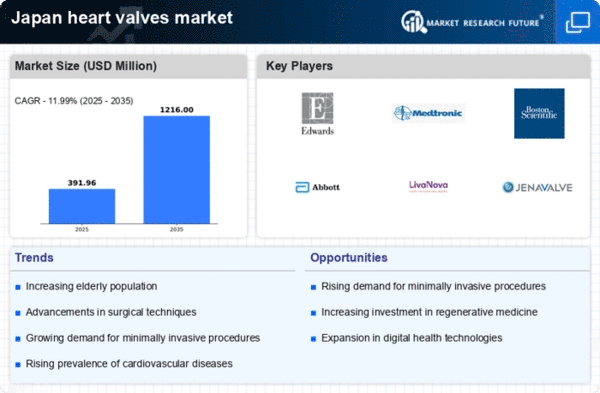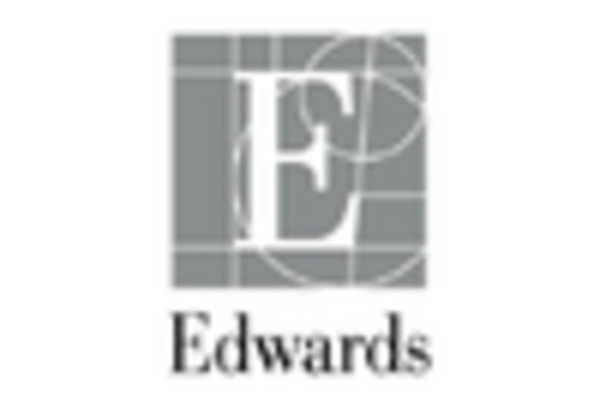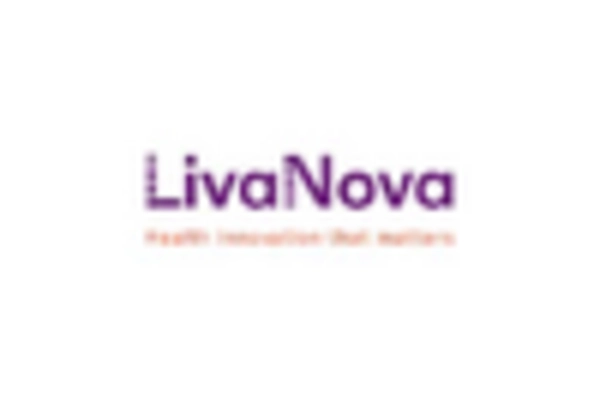Rising Cardiovascular Diseases
The increasing prevalence of cardiovascular diseases in Japan is a primary driver for the heart valves market. According to recent health statistics, cardiovascular diseases account for approximately 30% of all deaths in the country. This alarming trend necessitates advanced medical interventions, including heart valve replacements and repairs. As the population ages, the incidence of heart-related ailments is expected to rise, further propelling the demand for heart valves. The heart valves market is likely to experience substantial growth as healthcare providers seek innovative solutions to address these challenges. Moreover, the Japanese government has been investing in healthcare infrastructure, which may enhance access to advanced cardiac care, thereby stimulating market expansion.
Increase in Geriatric Population
The aging population in Japan is a significant driver for the heart valves market. As life expectancy continues to rise, the number of elderly individuals requiring cardiac care is also increasing. It is estimated that by 2030, over 30% of the Japanese population will be aged 65 and older. This demographic shift is likely to lead to a higher incidence of heart valve diseases, necessitating surgical interventions. The heart valves market must adapt to this growing demand by offering a range of solutions tailored to the needs of older patients. Additionally, healthcare systems may need to enhance their capacity to manage the complexities associated with geriatric cardiac care, further stimulating market growth.
Growing Awareness of Heart Health
There is a notable increase in public awareness regarding heart health in Japan, which is positively impacting the heart valves market. Educational campaigns and health screenings have led to a greater understanding of cardiovascular diseases and the importance of early detection. This heightened awareness encourages individuals to seek medical advice and treatment for heart-related issues, including valve disorders. Consequently, the heart valves market is likely to see a rise in demand for diagnostic and therapeutic solutions. As more patients become informed about their health, healthcare providers may experience an uptick in consultations and procedures related to heart valve interventions.
Government Initiatives and Funding
Government initiatives aimed at improving healthcare access and quality are pivotal for the heart valves market. In Japan, the Ministry of Health, Labour and Welfare has been actively promoting cardiovascular health through various programs and funding opportunities. These initiatives are designed to support research, development, and the adoption of innovative medical technologies, including heart valves. The heart valves market stands to benefit from increased funding for clinical trials and the establishment of specialized cardiac care centers. As a result, healthcare providers may be more inclined to adopt advanced heart valve solutions, thereby fostering market growth and improving patient care.
Technological Innovations in Valve Design
Innovations in heart valve technology are significantly influencing the heart valves market. The introduction of minimally invasive surgical techniques and advanced materials has revolutionized valve replacement procedures. For instance, transcatheter aortic valve replacement (TAVR) has gained traction, offering patients reduced recovery times and lower risks of complications. The heart valves market in Japan is witnessing a surge in demand for these advanced products, as they provide effective solutions for patients with aortic stenosis and other valve disorders. Furthermore, ongoing research and development efforts are likely to yield even more sophisticated valve designs, which could enhance patient outcomes and drive market growth in the coming years.
















